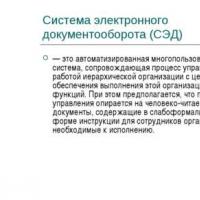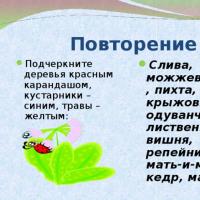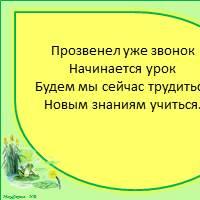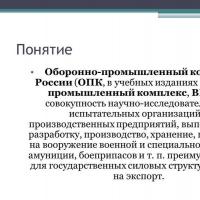Project on the topic of moral values. Presentation of a social studies lesson "moral values". And immediately, in a hurry to intervene
- Man is born to create his own life. A person is born to JUST LIVE!
- What do we value in life? What is the main value?
- Which life is especially valuable? Who should make life like this?
- A.S. Pushkin - poet
- Yu.A. Gagarin - cosmonaut
- Anna Kournikova -
- tennis player
- A.B. Pugacheva - singer
- M.V.Lomonosov –
- poet and scientist
- ancient Greek doctor
- They gave people their talent, knowledge, creativity
- What is the most important thing in life for a person?
- What does the happiness of parents depend on?
- Who cares about people's health in old age?
- Why does human life have special value?
- To value the life of any person, one must adhere to the golden rule of morality.
- “(Don’t) do to others as you (wouldn’t) want them to do to you.”
- About 2 and a half thousand years ago in the Himalayas there lived a man whose name was Buddha - “enlightened one”. He was a prince, but left his kingdom to travel. Getting to know the world, he knew a lot of grief and evil among people. Buddha wanted to teach people to be happy, to show them the path to happiness. Buddha believed that happiness must be followed along the path of good thoughts, good words and good deeds.
- Buddha teaches us:
- "Don't
- others that
- what do you think
- evil."
- Around the same time, the great philosopher Confucius (or teacher Kun) lived in the kingdom of Lu in China. He also wanted to teach people to live correctly, not to make mistakes, not to do evil. He said that he wanted to ensure that “old people live in peace, all friends are faithful, and young people love their elders.”
- Confucius said:
- “Only goodness leads to happiness.”
- In India, there is a belief that once upon a time, the first man Manu, the first prophet, the progenitor of people, was born there. He lived a long time and had children, grandchildren, great-grandchildren. He was very wise and in order to teach people to live in truth, correctly, he wrote a book called “The Laws of Manu”.
- The meaning of the laws of Manu:
- “Do not do to others what would hurt you.”
- In the once existing state of Judea, the Jewish people had a leader - Moses. They respected and honored him because he freed them and led them out of Egyptian slavery. During the journey (during liberation), the Jews and Moses experienced many difficulties, but God helped them. It was on the way to the mountain that Moses received from God the 10 commandments by which people should live.
- Ten Commandments of God.
- 1. I am the Lord your God, and there are no other gods besides Me. 2. Do not make for yourself an idol or any image; do not worship them or serve them. 3. Do not take the name of the Lord your God in vain. 4. Six days you shall work and do all your work, and the seventh—Sabbath—is a day of rest, which you shall dedicate to the Lord your God. 5. Honor your father and mother, that you may be blessed on earth and live long. 6. Thou shalt not kill. 7. Do not commit adultery. 8. Thou shalt not steal 9. Thou shalt not bear false witness. 10. Don't covet anything that belongs to others.
- I love you life
- Which in itself is not new.
- I love you life
- I love you again and again.
- Now the windows are lit,
- I walk home from work tired.
- I love you life
- And I want you to become better.
- Love your life!

FREE
NOT SINGLE

This is an opportunity to do as you want.
This is the ability to choose an option and
realization of the outcome of the event.
- this is freedom of speech,
choice, will,
religion,

“Freedom is the right to do everything and engage in everything that does not harm another. The boundaries within which everyone can move without harm to others are determined by law, just as the border of two fields is determined by a boundary post” (Korkunov N.M. )

Fables by I. Krylov
illustrations
Add
offer:
Every fable has...
What word
will you add?

- these are the rules and norms of behavior of people in relation to each other
and society.
An agreement between people on how to behave so that everyone can live comfortably.

“If you go to the right, you’ll lose your head, if you go to the left, you’ll be happy,” The hero reads on a stone at the intersection of three roads and makes a decision.

It is a conscious choice to solve a problem in a certain situation.
This is a person’s self-determination in relation to morality itself, in the choice of a value system.




Liberty
Moral choice
Moral conflict

If we talk and listen more often,
understand and find understanding,
Share joy and be happy for others,
The world will change for the better for everyone from U.S.
The work was carried out by history teacher E.E. Kamenskikh.
Slide 2
School today is one of the main moral institutions for the younger generation. Modern society today is going through a very painful period of formation. The era of endless change brings completely different values to the fore - material enrichment has become the main incentive for every modern young person. Often parents see their main goal as financially ensuring a prosperous future for their child. They work a lot and have little contact with their children. The main educator outside of school is television and other media - the Internet, violent games, a complex social environment.
Slide 3
The task of the school is not only to provide the necessary standards of knowledge and skills, but also to prepare the younger generation for a decent life. Educational work in its essence is a holistic education, consisting of parts, components, elements, functions that ensure the formation of an integral personality.
Slide 4
The Law “On Education” defines the basic principles of state policy in the field of education: Article 2 “Humanistic character of education, priorities of universal human values, human life and health, free development of the individual. Education of citizenship and love for the Motherland" Article 14 "General requirements for the content of education (determines the ideology of training and education) the content of education is one of the factors of economic and social progress of society and should be focused on ensuring the self-determination of the individual, creating conditions for his self-realization"
Slide 5
It must be remembered that educational work is dynamic in nature and consists of certain educational pedagogical situations that solve certain problems. It is necessary to avoid one-sidedness and fragmentation in planning educational activities; its design should be more holistic, consistent with the age, interests, and preparedness for the perception of students.
Slide 6
a person develops in specific activities that are significant to him, and not all things contribute to his development; determine the possibilities and conditions of the social environment in providing students with a free choice of the type of activity that meets their interests, inclinations, abilities, the capabilities of teachers and the social microenvironment; direct the life activities of students for self-development, self-realization and self-determination; - implement a creative approach to planning educational work in the classroom, the form, place and time of carrying out the main activities and organizing life situations for all students. - coordination of educational and educational processes in their influence on the formation of the personality of students;
Slide 7
independent activities of students should be planned, pedagogically oriented and organized; - specificity, mandatory implementation of the tasks included in the plan, a reasonable combination of verbal, visual, practical forms of educational work, orientation towards active methods of education are necessary; - the logic of constructing cases based on the life situations of students, corresponding the logic of educational goals; - takes into account the work of the school with the possibilities of the microsociety and the country’s anniversaries.
Slide 8
Basic components of the content of education: - worldview - focused on the image of a graduate; - activity - experience in the implementation of educational values; - cultural - focused on universal human values, Russian culture; - behavioral - culture of behavior - building personal relationships; - personal - development of the ability to self-regulation.
Slide 9
Components of the basic culture of the individual - cognitive culture; - moral culture; - aesthetic culture; - physical culture; - labor culture.
Slide 10
Approximate scheme for analyzing extracurricular activities1. Content assessment: - purpose; - relevance of the topic; - place and role of this event in the system of educational work with class students; - scientific nature; - compliance of the content with the age of the students, psychophysical characteristics and level of intellectual development; - continuity of the content of educational and extracurricular educational work.
Slide 11
2. Forms and methods of conducting - pedagogical feasibility of choosing the form of the event - lesson, quizzes, debate, reading conference, meeting, round table, gatherings, press conference, teleconference, performance and others; - does the class teacher take into account the level of development and preparedness of students, their age and individual characteristics, capabilities; - the role of class self-government, what participation in the organization the students took, who prepared the event, the participation of students in the performance and contribution to the activity, in the proposal for encouragement; - the level of activity and independence of students; - the work of the class teacher on the development abilities of students; - participation of teachers, parents in the preparation and conduct of the event; - how the results were summed up, analysis of the case, the event.
MY MORAL VALUES
Presentation
teachers of GOU TsO No. 1420
Leonova Svetlana Vladimirovna

TARGET:
Discuss with students the concepts of “value”, “price” in their literal and figurative meaning;
Develop students' ability
comprehend and determine for oneself imaginary and true values.
“Values are a general name for imaginary values that have their own price, and for genuine values that become imaginary,
as soon as a price is assigned to them.”

- There are no wrong opinions.
- When one speaks, others listen.
- No one joins anyone.
- You can say the same thing, but in different words.

"Stairs
Desires"
Choice….
What will it be like?

Let's try to think about what our movement will be?
Create a situation

PRICE And VALUES ?
Exercise:
Using the dictionary V.I. Dahl establish the differences.

PRICE
These are material objects (fur coat, car)
VALUE
Exists outside of man, independently of him.
Most are spiritual objects, or material objects that have value for a person or society (memories, photographs, letters, works of art, etc.)
The price is subject to capture and violence.
Exists in relation to a person
The price is exhaustible. As a thing ages, the price goes down.
Value cannot be captured. A person may die, but values remain
to anything.
in mind.
When exchanging, the price preserves itself (exchanging apples - everyone again got one)
Value does not age, it is inexhaustible,
The price is always replaceable (product – product)
does not burn, does not sink, etc.
When exchanging, the value increases (exchange of ideas - now everyone has two)
The value is irreplaceable.

Game "Buy - Sell".
Target: determine what has value and what has price.
Game conditions: game in pairs, the task of one is to persuade the item to be sold. The other must resist as long as possible, putting forward compelling arguments.

- value – this is everything that is significant for the life of a person and people in this society;
- price – is the cost of something, expressed in monetary units.

LEGEND
In one of the countries, it doesn’t matter
in which one old woman lived. For many years she walked with a stick along the beach during the height of the summer season. Many people were perplexed
and did not understand what she was looking for in the sand, raking it with a stick. It was only years later that people found out that for years she had been walking along the beach with only one
goal - she collected shards of broken glass so that adults and children
didn't get hurt.

Questions for students:
How much have you achieved?
this old lady in real life?
What do you think he was like?
her path up the ladder of life?
What were her values in life?

Golden Rule of Morality
Do unto others as you would have others do unto you.


A moment of revelation
In a short period of your life, you have taken quite a lot of life steps. Try to determine which of them were significant, important, which you can compare with the actions of the old woman, and which ones you would not want to remember.

Finish the sentence:
A successful person in life is a person who...
A loser is a person who...
If a person does not have ....., then he did not succeed (he lived his life in vain)
If a person has….., then he has succeeded.

imaginary values
true values

Blind
Not seeing people in front of me,
Without noticing the benches in the park,
A blind man is walking down the street
Touching the ground with a stick.
He'll be pushed
They will pass forward
And immediately, in a hurry to intervene,
Some sighted person will call.
Be sensitive.
And don't push.
Quiet in human hum:
- Push... it's nothing...
I will know
What's nearby - ___________.
Vasily Fedorov.
PEOPLE



 Presentation electronic document management
Presentation electronic document management Where can I get a certificate of state registration of individual entrepreneurs?
Where can I get a certificate of state registration of individual entrepreneurs? Order on the appointment of a responsible representative
Order on the appointment of a responsible representative Presentation of cultivated and wild plants
Presentation of cultivated and wild plants Presentation on literary reading "frog traveler"
Presentation on literary reading "frog traveler" Terms of reference for the provision of services for organizing and providing food (sample form)
Terms of reference for the provision of services for organizing and providing food (sample form) Russian military-industrial complex Kazan is a major center
Russian military-industrial complex Kazan is a major center